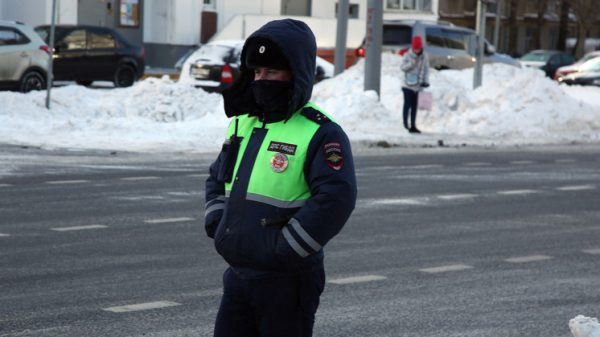 RMT members work on strikes as part of London Underground plan in February and March Photo: Simon Newman/Reuters
RMT members work on strikes as part of London Underground plan in February and March Photo: Simon Newman/Reuters
Commuters sigh with relief relief after the RMT union called off industrial action due to take place this week following an improved wage offer.
More than 300 London Overground workers were to go on strike, which includes walkouts and actions not related to the strike.< /p>
However, future strike dates remain in place until workers vote on a new proposal this week.
Here's everything you need to know about the upcoming strikes.
When will the train strikes take place?
Aslef union members went on strike for five days from Tuesday, January 30 to Monday, February 5, and also banned overtime for nine days, starting on January 29. A total of 16 train operators were affected.
RMT union members on the London Underground have called off strikes on 19 and 20 February, but are keeping strikes due in March in place for now.
Monday 19 February: London Overground — Suspended
Tuesday 20 February: London Overground — Suspended
Monday 4 March: London Overground
Tuesday 5 March: London Overground
Will there be more national train strikes?
Train drivers in Aslef have voted to continue their strike for another six months as part of their long-running dispute over pay and conditions.
The dispute is with 16 railway companies: Avanti West Coast; Chiltern Railways; s2s; Directly; East Midlands Railway; Greater England; GTR Great Northern Thameslink; Great Western Railway; Island line; LNER; Northern trains; Southeastern; Southern/Gatwick Express; South Western Railway Main Line; SWR depot drivers; Transpennine trains; and West Midlands Trains.
The union has active industrial action mandates until August at all train companies with which it has a dispute. This means passengers will face the threat of industrial action until then unless an agreement is reached.
In a separate dispute over national wages, Northern and LNER train drivers are to go on a one-day strike and ban overtime. for three days.
Aslef members of the two operators will withdraw from the game on Friday. , March 1, and will take action, short of a strike, from Thursday, February 29, to Saturday, March 2.
The union says the agreements are not being respected.
Members of the Rail, Maritime and Transport (RMT) union have also been on strike since June 2022. But they voted overwhelmingly in December to accept an agreement that would end their long-running dispute over wages and working conditions. Under the agreement, the union will suspend industrial action until at least April 2024 in exchange for a backdated payment offer that would put all members in line for a one-off Christmas payment of at least £1,750.
What about minimum levels? service?
A bill on minimum standards for passenger rail, ambulance and fire and rescue services was passed in July to ensure essential services remain intact. This means employers will be able to fire employees who refuse to come to work when ordered to do so, and unions that fail to meet minimum requirements could face legal action.
However, Aslef responded by warning about such legislation. may aggravate any strike.
Mr Whelan said: “Having seen the determination of our members and the support of train drivers among our passengers and the public since this dispute began in June 2022, the Tories have now tried their old trick of changing the rules.”
“When they couldn't force us to back down, they introduced minimum service levels — designed to effectively ban strikes, rendering them ineffective — but this new law will not ease labor struggles. This will only make the situation worse.»
Advice for traveling during train strikes
Transport for London advises passengers to use the status update tool before traveling and check alternative routes.
 RMT general secretary Mick Lynch said his workers were «furious» at their latest pay proposal. Photo: Lucy North/PA Are Aslef close to a deal?
RMT general secretary Mick Lynch said his workers were «furious» at their latest pay proposal. Photo: Lucy North/PA Are Aslef close to a deal?
Aslef general secretary Mick Whelan is dismissive of the chances of a deal.
He has repeatedly refused to table the proposal made to members in April last year, calling the proposal for a 4% pay rise «ridiculous.»
He said: «Our members have voted for industrial action time and time again since then.» . That's why Mark Harper, the transport minister, is disingenuous when he says the proposal should have been addressed to members.
“Drivers obviously wouldn't vote for strike action over and over again if they thought it was a good thing offer. They don't. This proposal failed last April, and I think Mr. Harper knows it.
“But we, as always, remain open and willing to talk about a revised proposal. That's why we're asking the Secretary of State for Transport or the Minister for Railways, Hugh Merriman, to come and meet us. Mr. Harper has not seen fit to speak to us since December 2022; Mr. Merriman has not been in the room with us since January 2023; and RDG has not spoken to us since April last year.
“Our message to Mr. Harper, Mr. Merriman, RDG and TOC is clear today: come and talk to us. Let's sit down at the table and come to an agreement. You don't want more strikes and we don't want to be forced into more strikes, although we have renewed mandates to do just that.
“We want to find a solution to this dispute for members who have not been promoted wages since our last deals expired in 2019, and the only way to resolve this dispute is for employers and the government that stands behind them to come and talk to us.< /p>
“That's why I I say the ball is in your court. We're ready to talk. And you?”






















































Свежие комментарии